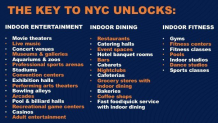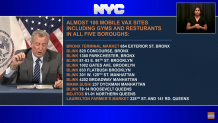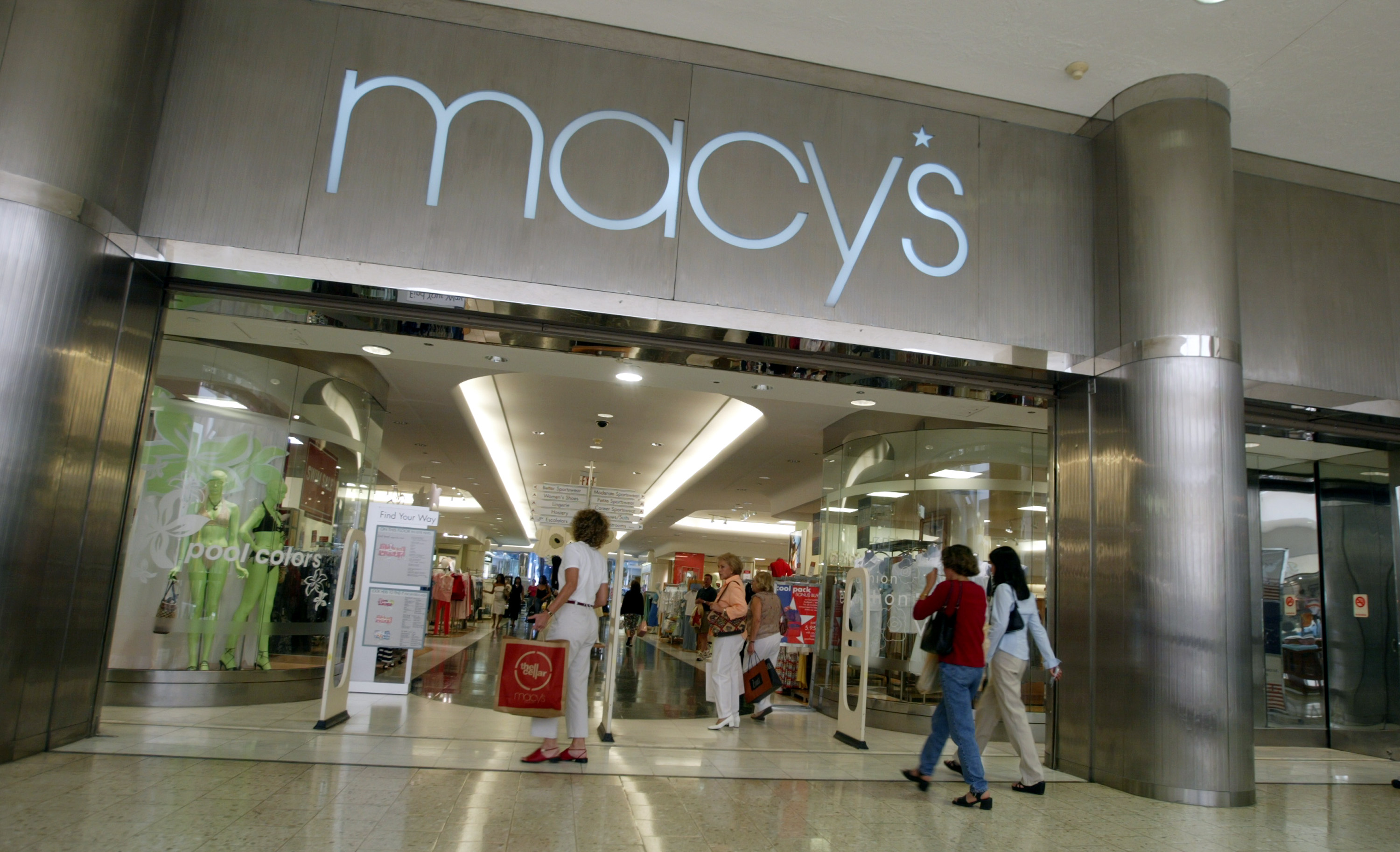What to Know
- New York City is the first major U.S. city to require anyone dining indoors at a restaurant, working out at a gym or grabbing a cocktail at a bar to show proof they’ve been inoculated from COVID-19
- Workers at such establishments would also have to prove that they’ve had at least one shot of an approved vaccine
- It's the most aggressive step the city has taken yet to curb a surge in cases caused by the delta variant. Data shows that about 67.5% of adults in New York City are fully vaccinated and 72.4% have had at least one dose
New York vaccine mandates are rapidly expanding by the day, with the state ordering hospital and nursing home workers to get COVID-19 inoculations and New York City poised to start requiring them for anyone in restaurant dining rooms, gyms, museums and many other leisure venues.
The new policies aim to goad people into getting vaccinated as New York, like the rest of the country, confronts a coronavirus wave powered by the highly infectious delta variant of the virus.
As vaccination rates leveled off this summer, some cities, states and federal agencies have rapidly shifted from encouraging vaccination to either-or requirements — inoculation or testing — to a flat-out insistence on vaccination for some settings or workforces.
Get Tri-state area news delivered to your inbox. Sign up for NBC New York's News Headlines newsletter.
“Just buy into this because it’s going to work for all of us, is going to make us all safer,” New York City Mayor Bill de Blasio said Monday.
In a nationwide first for a city government, the Democrat announced earlier this month that proof of vaccination would be required to partake in much of public life, from indoor dining to gym workouts to theater. Other cities, including San Francisco, later followed New York's move.
New York City's mandate goes into effect Tuesday, though actual enforcement won't start until Sept. 13.
Local
It applies to patrons, employees, New Yorkers, commuters and visitors alike in settings ranging from arenas to coffee shops to yoga studios. Even strip clubs are included.
There are exceptions for children under 12 — who are not yet eligible for vaccination — and athletes, contractors and some performers who don't live in the city. The policy also excludes church potlucks, community centers, office buildings, house parties (even if they're catered) and people ducking in somewhere to pick up food or use the bathroom, among other exemptions.
Nearly three dozen varieties of indoor settings will be subject to the policy and if they don't comply, could face a $1,000 fine.
City officials promised training for businesses on how to handle possible confrontations between patrons and staffers, who will be on the frontlines of checking vaccination status. The webinar will be made available to businesses by Aug. 20 to help train workers in de-escalation practices. Participating workers are encouraged to visit the city's frequently asked questions page for additional info.

The Metropolitan Museum of Art, one of the city’s most visited venues, said it was working on how to implement the new rule but supports it.
So does the NYC Hospitality Alliance, a restaurant and bar owners' group, though executive director Andrew Rigie said the vaccine checks add another challenge for establishments struggling to recover from pandemic shutdowns and a labor shortage. But restaurateurs hope the requirement will help keep the outbreak from worsening and spurring more onerous restrictions.
On Tuesday, the mayor said that the city will continue with its vaccination information outreach, including when it comes to the vaccine mandates, by sending out 600 canvassers throughout the city to inform businesses. The city will also launch a $10 million ad campaign. Small businesses can also obtain help and information on the mandates by calling 888-SBS-4NYC.
New York Vaccine Mandates
New York state's new policy for hospitals and long-term care facilities follows vaccination requirements for health care workers in California, members of the U.S. military, and patient care staffers in the federal Health and Human Services Department and Department of Veterans Affairs. Some private businesses, from Google to United Airlines, also have ordered employees to get the shot.
“Our healthcare heroes led the battle against the virus, and now we need them to lead the battle between the variant and the vaccine,” said Gov. Andrew Cuomo, a Democrat who is leaving office later this month after resigning over sexual harassment allegations, which he denies.
The seven-day rolling average of daily new cases in New York has risen over the past two weeks from over 2,400 new cases per day to nearly 4,200, according to figures compiled by Johns Hopkins University. New York City averaged 2,000 new cases of coronavirus per day over the past seven days, up from around 200 per day in late June. On Tuesday, the state said that within the last 24 hours, 18 people have died of COVID-19 and 91 have been hospitalized (with seven in intensive care). The daily positivity rate is nearing 4 percent (3.94%).
As of Tuesday, there have been 36,475 vaccine doses administered over the past 24 hours and 309,169 doses administered over the past seven days. According to the state, of these figures, 74.8% of New Yorkers ages 18 and older received at least one vaccine dose and 68.3% completed the vaccine series. Meanwhile, according to state data, 62.9% of all New Yorkers received one vaccine dose; 57% completed the series.
New York state took a more limited step late last month, requiring vaccination for staffers who work directly with patients at state-owned hospitals and veterans homes. Asked whether the new policy applies only to front-line workers, and whether it would also extend to such settings as medical offices and home health care, state Health Department spokesperson Jill Montag said the agency was working to finalize the details.
About 75% of the roughly 450,000 hospital workers statewide, 68% of the 145,500 nursing home workers and 74% of the 30,000 other adult care facility workers are fully vaccinated, Cuomo’s office said in a release. That compares to about 58% of all New Yorkers, and 70% of those 18 and older.
The Greater New York Hospital Association, a statewide advocacy group, called workers' vaccination rates “impressive,” while endorsing the new requirement.
“This is a critical moment requiring bold action,” President Kenneth Raske said, noting that many hospitals already had their own vaccine mandates.
There was no immediate comment from SEIU 1199, a major health care workers' union, or the New York State Nurses Association, which represents 42,000 nurses.
Under the new policy, workers in hospitals, nursing homes, adult care, and other congregate care settings will have to get at least a first dose of vaccine by Sept. 27, with what the state called “limited exceptions for those with religious or medical reasons.”
On Tuesday, de Blasio also said they are revamping their efforts to bringing vaccinations into the communities by rolling out nearly 100 mobile sites including in gyms and restaurants in all five boroughs.

According to de Blasio, incentives, mandates and informational tools have increased vaccination rates within the city lately: 30% over the past week and a 52% increase in the past two weeks.
While officials are urging some people to get vaccinated, the Health Department on Monday authorized additional doses for people with severely weakened immune systems.
The federal government on Friday approved third doses of the usually two-shot Pfizer or Moderna vaccines for transplant recipients and other similarly immune-compromised patients, but not the general public.
New York had its own task force of scientists and health experts review the matter before giving the OK in the state.
Meanwhile, U.S. experts are expected to recommend COVID-19 vaccine boosters for all Americans, regardless of age, eight months after they received their second dose of the shot, to ensure lasting protection against the coronavirus as the delta variant spreads across the country. New York City will offer boosters as appropriate, as recommended starting at some point in September.
Not sure how the process works? Check out our handy tri-state vaccine site finder and FAQs here
New York City and New Jersey Vaccine Providers
Click on each provider to find more information on scheduling appointments for the COVID-19 Vaccine.
Data: City of New York, State of New Jersey • Nina Lin / NBC



